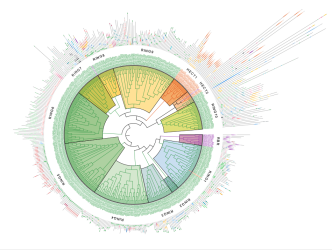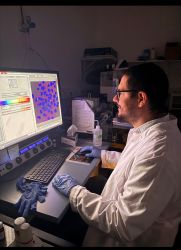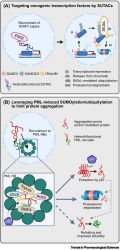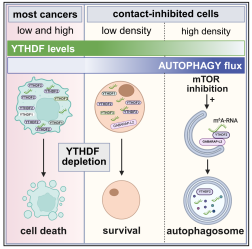News from the Institute

In a new publication in Nature Communications, a team of researchers from IBC2 at Goethe University Frankfurt, reports the first comprehensive, data-driven classification of all human E3 ubiquitin ligases. The study presents a systematic map of the human “E3 ligome” and provides new insights into the functional relationships among E3 ligases.
... (read more)
For the eighth consecutive year, IBC2 Director Ivan Đikić has been named as a Highly Cited Researcher, recognizing his outstanding influence in the life sciences. His research papers have ranked among the most cited from 2014 to 2024 in the two categories “Biology and Biochemistry” and “Molecular Biology and Genetics”, as recorded by Web of Science.
... (read more)
The first Rhine Main Universities (RMU) Award for Pharmaceutical Research & Innovative Medical Therapies, sponsored by the Frankfurt Foundation Quality of Medicines, will go to IBC2 scientist Cristian Prieto-Garcia from the Dikic group. The award recognizes his groundbreaking work uncovering how deregulated RNA splicing drives proteotoxicity, opening new therapeutic avenues.
... (read more)
In their recent review (published in Trends in Pharmacological Sciences) IBC2 researchers Gina Gotthardt, Jan Keiten-Schmitz, and IBC2 Vice Director Stefan Müller discuss how SUMO-signaling and SUMO-targeted ubiquitin ligases (StUbLs) can be exploited to inactivate disease-associated proteins. The review explores the new therapeutic possibilities that this opens within the field of drug discovery utilizing the ubiquitin-proteasome system.
... (read more)
Scientists from IBC2 in collaboration with colleagues from the University of Regensburg show that when non-transformed cells reach high density and contact inhibition kicks in, the m⁶A reader proteins YTHDF1-3 are actively cleared by autophagy, a process that can also be triggered with the mTOR inhibitor Torin1. In contrast, cancer cells that evade contact inhibition retain YTHDF proteins, pointing to a growth-control checkpoint that tumors bypass. The work, led by Alexandra Stolz and Gunter Meister as well as Hung Ho-Xuan as the leading author, links YTHDF stability directly to the mTOR–autophagy axis and suggests coordinated turnover of both proteins and their m⁶A-modified RNA clients by selective autophagy.
... (read more)